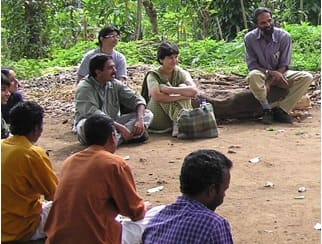
Sustainable self-determination
Claims of self-determination of indigenous peoples (and local communities) are generally dealt with by state governments and international human rights lawyers. They depend in many ways on the presence and role of state governments and/or international systems of law, such as UN Conventions and treaties. The nuanced concept of ‘sustainable self-determination’ provides a profoundly diverse understanding of indigenous peoples and their complex relationships to place and the natural world. The concept, developed by the Cherokee scholar Jeff Corntassel and readily welcomed and adopted by the ICCA Consortium, proposes an alternative to state-led processes of ‘allowing self-determination’ that remain entrenched in patterns of colonialism (the State – perpetuator of violence – supposedly becomes the saviour that provides solutions to indigenous struggles; these solutions are based on liberalism and fragmented rights frameworks, detached from indigenous identities and custodianship roles).
Sustainable self-determination proposes to regain sight of the centrality of relational responsibilities, as opposed to a strict focus on a rights-based system where nature and people – the community, family, clan, kinship, homelands – are detached one from the other, taken for granted, and only used to respond to the needs of individuals. According to Corntassel, the transmission of indigenous and local knowledge to future generations, and the generation of new forms of community knowledge – something that happens, or should happen, in the daily relations of maintaining livelihoods – are the necessary ground to express sustainable self-determination. Importantly, such responsibilities extend beyond humans alone, to the rest of nature. Such relational responsibilities, rooted in place and kinship and often contained or expressed through customs and norms rather than codified in legal statutes and/or court decisions, characterise mature communities, ready to both command respect for their rights and fulfil their responsibilities.[1]
The concept rebalances attention towards the local, the community, the reality of the lives and identity of indigenous peoples and local communities rather than towards national and international fora, which are not part of the history, institutions or culture of many such peoples and communities. The process of sustainable self-determination focuses on the myriad ways in which indigenous nations and local communities act every day to protect and perpetuate their territories of life while nurturing and strengthening their own community health and well-being. In this sense, sustainability, care for the environment and care for future generations are at the same time goals and means of regeneration and renewal.
The re-discovery and implementation of customary law may lead to a resurgence of indigenous peoples and local communities beyond the state, as distant as possible from the processes of assimilation into mainstream culture that currently endangers indigenous and community identities and sustainable ways of life. Sustainable self-determination means regaining vision and control of indigenous and community cosmo-visions, livelihoods, sacred sites and rites, languages, culture and economic systems. By maintaining (or regenerating) the ability to transmit them to future generations, it sets in motion a virtuous cycle of thriving nature through responsibility and care. In this sense, sustainable self-determination is at the very heart of the concept and practice of ‘territories of life’ and of the ICCA Consortium as an organisation devoted to their appropriate recognition and support.
Key references: Corntassel, 2008; Corntassel, 2012; Corntassel and Bryce, 2012; Farvar et al., 2018.
[1] Importantly, as stressed by Kothari et al. (2012) such mature communities should also be open to enhance their own internal equity, including regarding classes of age, socio-economic status and #gender.